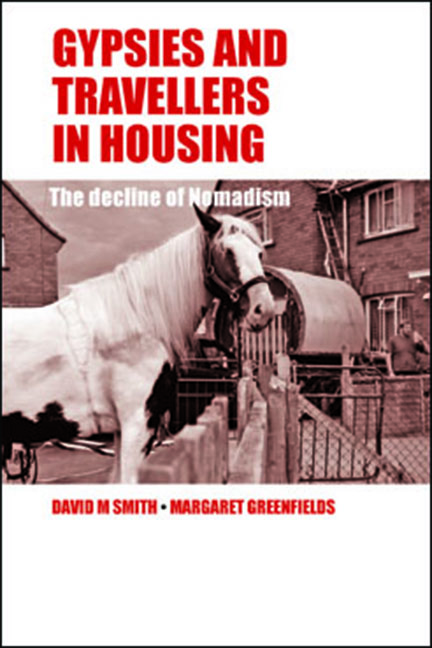Book contents
- Frontmatter
- Contents
- List of tables
- Acknowledgements
- Foreword
- one Introduction
- two Space, surveillance and modernity
- three Gypsies, nomads and urbanisation: a social history
- four The research sites and population sample
- five Routes into housing
- six Housing transitions
- seven Gypsies, Travellers and gorjers: conflict and cooperation
- eight Recreating community
- nine Young people in housing: aspirations, social relations and identity
- ten Conclusion
- Appendix A Methodologies
- Appendix B Glossary of words and terms
- References
- Index
Foreword
Published online by Cambridge University Press: 03 February 2022
- Frontmatter
- Contents
- List of tables
- Acknowledgements
- Foreword
- one Introduction
- two Space, surveillance and modernity
- three Gypsies, nomads and urbanisation: a social history
- four The research sites and population sample
- five Routes into housing
- six Housing transitions
- seven Gypsies, Travellers and gorjers: conflict and cooperation
- eight Recreating community
- nine Young people in housing: aspirations, social relations and identity
- ten Conclusion
- Appendix A Methodologies
- Appendix B Glossary of words and terms
- References
- Index
Summary
This in-depth study of the historic and mainly contemporary circumstances for traditionally nomadic Gypsies and Travellers is timely and deeply shocking. The authors, both social scientists with long-term relevant lived and research experience, combine a broad policy overview with the minutiae of everyday lives from the Gypsy/Traveller perspectives. We are introduced to the cumulative consequences of explicitly negative legislation, alongside deceptively banal micro controls. All of these have the effect of restricting, indeed criminalising, the preferred lifestyles of a people who have survived as nomads hitherto for centuries. Here the late 20th-century history of Gypsies and Travellers in Britain contrasts with the earlier brutally enforced settlement of Gypsies/Roma in communist Europe. A museum near Krakow in Poland documents the seizure from Gypsies of their horses and wagons in 1968, before their compulsory settlement in concrete Soviet-style flats. Is this the fate for British Gypsies who, as the text reveals, are being settled but sometimes by a less visible, seemingly gentle force? Only the multi-million pound eviction of Dale Farm, Essex, in 2011 made a rare media intrusion (Okely, 2011).
While there is welcome increased sensitivity in the UK to racism directed at those of African and Asian descent, the reader of this text is confronted by the casual indifference and arrogant ignorance of any additional racisms towards Gypsies and Travellers. Recent populist internet comments declare it is not racist to lambast fellow ‘white Anglo-Saxons’. It is only recently that Traveller groups with no claim to Indian origin have finally gained recognition as ethnic groups, for example the Northern Irish then Scottish Travellers, (cf McVeigh, 1997; Clark, 2008). Thus it is finally accepted that separate ethnic groups need not require exotic orientalisation and non-European origins before rights of autonomy are legally respected (Said, 1978). Smith and Greenfields draw attention to the observations of Trevor Phillips. Supposedly liberal-minded journalists show neither curiosity nor shame concerning entrenched presumptions about so-called ‘indigenous drop-outs’.
Thanks partly to policy practitioners, with neither curiosity nor respect for different though interrelated trading histories, Gypsies and Travellers are lumped together with an increasingly fragmented white working-class, themselves the victims of deindustrialisation and economic disaster. Local officials conveniently redefine caravan dwellers denied legal stopping places as homeless, then in seemingly benevolent tradition place them on ‘sink estates’ where imagined commonalities with the non-Gypsy poor are presumed to minimise conflict.
- Type
- Chapter
- Information
- Gypsies and Travellers in HousingThe Decline of Nomadism, pp. vii - xxPublisher: Bristol University PressPrint publication year: 2013



